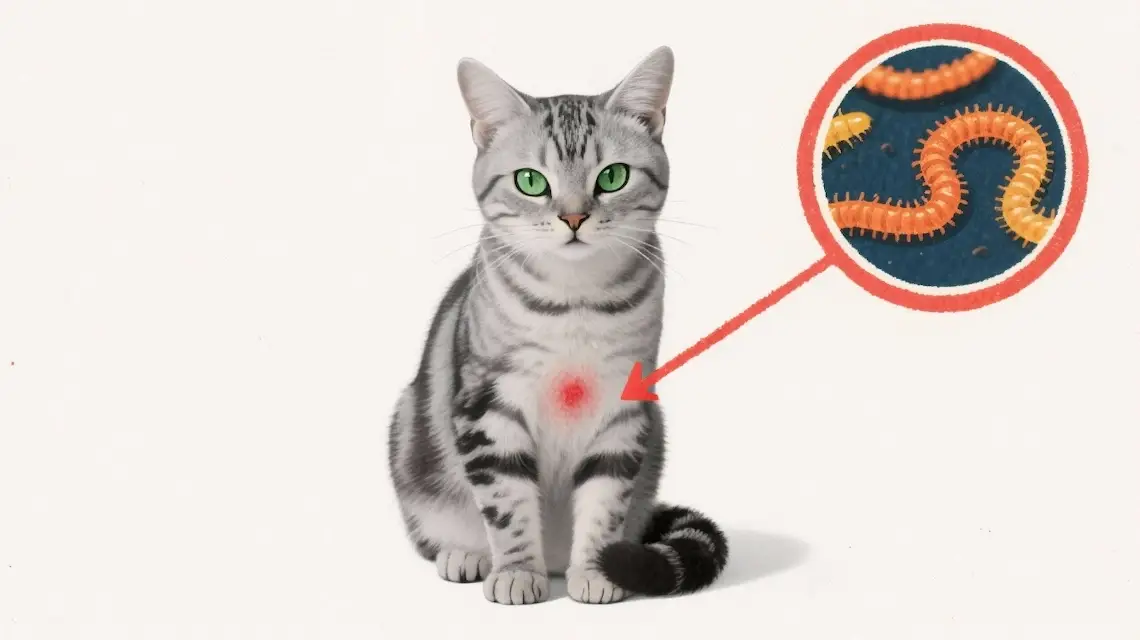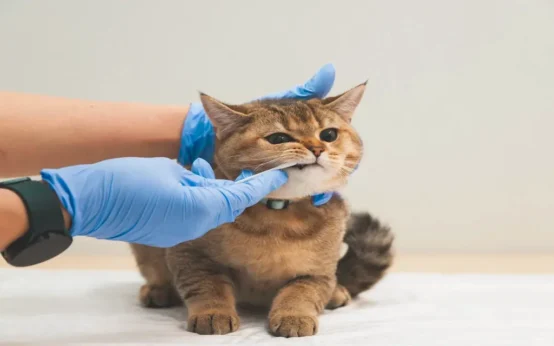Can cats get heartworms? Yes, and the disease looks different than in dogs. A single worm can trigger serious lung and heart problems in a cat. Mosquitoes spread the parasite, so even indoor cats are at risk. A cracked window, a quick door open, or a stubborn mosquito hiding in a plant is all it takes.
This guide answers the question do cats get heart worms, then goes deeper into how infection happens, what to watch for, and how vets diagnose and manage it. You will learn why cats are tricky to test, why treatment is different from dogs, and what real prevention looks like. The goal is simple, keep your cat breathing easy and safe year-round.
Let’s break down how heartworm affects cats, what symptoms matter, and the steps you can take today.
How Do Cats Get Heart Worms? Life Cycle, Risk, and Why Cats Are Different
Heartworms are parasites called Dirofilaria immitis. They live in the arteries of the lungs and sometimes the heart. Mosquitoes are the middleman. They pick up baby worms when they bite an infected animal, then pass larvae to the next host.
After a bite, larvae move through the tissues, grow, and head to the pulmonary arteries. In dogs, they mature easily. In cats, things are less predictable. Cats are atypical hosts. They often carry low numbers of worms, have immature worms that never fully develop, or carry only male or only female worms. Even so, their immune system reacts strongly. That reaction can inflame the lungs and arteries and cause breathing issues.
Compared to dogs, heartworm in cats is less common but not rare. It also tends to be underdiagnosed. Mosquito exposure matters most. Warm, humid regions have higher risk, but cases occur in most states. Indoor cats are not protected by walls alone. Mosquitoes get inside.
The early stages often trigger a syndrome called heartworm-associated respiratory disease, or HARD. Think of HARD as airway inflammation that looks like asthma. Even a single worm can cause lasting damage. That is why prevention is so important for every cat, indoor or outdoor.
What heartworms are and how mosquitoes infect cats
Heartworms are long, thread-like worms that settle in lung arteries. The chain starts when a mosquito bites an infected animal and takes in microfilariae, the baby stage. Inside the mosquito, those babies grow into larvae. When that mosquito bites a cat, it deposits larvae into the skin.
Over weeks to months, the larvae migrate through tissues and reach the pulmonary arteries. There, they grow larger and trigger inflammation. In some cats, worms reach adulthood. In others, they stay immature but still cause trouble. The timeline varies, and not every step completes in cats, which is part of the challenge.
How common is heartworm in cats vs. dogs
Dog cases are more frequent because dogs are the preferred host. Cats get infected less often, yet they are often missed. Low worm counts can hide on tests. Many cats never show obvious signs until they struggle to breathe.
Risk rises in warm, humid areas, and wherever mosquitoes thrive. Think Gulf Coast, Southeast, river valleys, and long summers. That said, feline heartworm shows up across most states. Travel, rescues, and indoor mosquitoes blur old risk maps. Low worm numbers do not mean low danger.
Why cats react differently to heartworms
Cats often carry fewer worms, or only immature worms. That means common antigen tests can come back negative. The problem is, cats still mount a strong immune response. Lung tissue becomes inflamed, airways spasm, and breathing gets hard.
This pattern is called heartworm-associated respiratory disease. HARD can mimic feline asthma, with coughing, wheezing, and fast breathing. A cat might vomit instead of coughing, which confuses things. Even without adult worms, the inflammation from migrating larvae can make a cat very sick.
Symptoms of Heartworm in Cats: Early Signs, Emergencies, and What Looks Like Hairballs
Symptoms range from mild to life-threatening, and some cats show no signs until a crisis. Vomiting without food, coughing, and fast or labored breathing are common. Because vomiting is common in cats, people often blame food or hairballs. That delay can cost precious time.
Group symptoms by urgency. Watch the early clues, and know the emergency red flags. Heartworm can look like asthma, bronchitis, or even hairballs. When in doubt, call your vet. Breathing issues can escalate fast.
Early and common signs to watch for
- Coughing or gagging that comes and goes
- Wheezing or noisy breathing
- Vomiting, often clear foam or bile, not tied to meals
- Reduced appetite or picky eating
- Weight loss over weeks or months
- Tiredness, less play, sleeping more
- Hiding or avoiding activity
Signs may wax and wane. A cat can seem fine, then cough or vomit again. Document episodes with dates and short videos if you can. Those details help your vet spot patterns.
Emergency signs that need a vet now
- Trouble breathing or rapid breathing at rest
- Open-mouth breathing or gasping
- Blue, gray, or very pale gums
- Sudden collapse or fainting
- Seizures
- Extreme weakness or inability to stand
These are true emergencies. Call your vet or an emergency clinic right away. Keep your cat calm and warm, and avoid stress during transport.
Is it asthma, hairballs, or heartworm?
Asthma and heartworm can look alike. Both can cause coughing, wheezing, and fast breathing. HARD often mimics asthma, and many cats with heartworm get treated for asthma first.
Hairball retching usually ends with a hairball. Heartworm-related vomiting often produces foam or bile and nothing else. If your cat coughs, breathes fast, or vomits without a hairball, schedule a checkup. Any breathing issue needs a vet visit, even if your cat acts normal afterward.
How Vets Test and Treat Heartworm in Cats
Diagnosing feline heartworm is tricky. Cats may have no adult worms, or only males, which can make antigen tests negative. Antibody tests show exposure but not always a current infection. Imaging helps, and your vet may combine several tools to reach an answer.
There is no safe drug to kill adult heartworms in cats. Treatment focuses on stabilizing the cat, reducing lung inflammation, and monitoring for complications. Some cats improve over time as worms die and the body clears them. Others need long-term care. Close follow-up matters.
Diagnostic tests vets use and their limits
- Antigen test: Detects proteins from adult female worms. It can miss infections with low worm counts or with only male worms.
- Antibody test: Shows that a cat has been exposed to larvae. A positive test does not always mean living worms are present now.
- Chest radiographs (x-rays): Show lung patterns, artery changes, and heart size. Helpful for spotting HARD and other causes.
- Echocardiography (ultrasound of the heart): May show worms in heart or pulmonary arteries in some cases.
- Microfilariae check: Cats rarely have baby worms in the bloodstream, so this test is often negative.
Vets often combine tests and repeat them after weeks or months. The goal is to piece together exposure, inflammation, and possible adult worms. Your vet will also rule out asthma, bronchitis, pneumonia, and other heart or lung disease.
Treatment options for cats with heartworm
There is no approved adulticide for cats. Drugs used in dogs are unsafe for cats. Care centers on supportive treatment.
- Corticosteroids reduce lung inflammation and ease breathing.
- Oxygen therapy helps in crises.
- Bronchodilators may ease airway spasm.
- Fluids and anti-nausea meds support cats that are vomiting.
- Strict rest reduces strain on the heart and lungs.
In rare cases, if worms are visible in the heart and causing shock, a specialist may remove them using a catheter. This is not common and carries risk. Most cases rely on careful medical management and time. Never start or stop steroids or bronchodilators without vet guidance.
Recovery, monitoring, and quality of life
Expect rest and routine follow-ups. Your vet may repeat x-rays, ultrasound, or blood tests over months. Watch your cat’s breathing rate while resting. Many vets suggest counting breaths while the cat sleeps. Normal is usually under 30 breaths per minute. Higher rates can signal trouble.
Some cats improve as worms die off and inflammation settles. Others have lasting airway sensitivity. Quality of life can still be good with careful monitoring, quick response to flare-ups, and consistent vet care.
Heartworm Prevention for Cats: Year-Round Protection for Indoor and Outdoor Pets
Prevention is the hero. Monthly preventives stop larvae before they mature and harm the lungs. Give prevention all year, even if you rarely see mosquitoes. One missed dose can leave a gap.
Products for cats usually contain macrocyclic lactones, such as selamectin, moxidectin, or milbemycin. Some combine heartworm prevention with flea or tick control. Your vet will guide you based on age, weight, medical history, and local parasite risks.
Year-round prevention and product options
Monthly dosing keeps larvae from settling in. Skipping doses raises the risk that larvae mature. Set reminders on your phone, or tie dosing to a monthly bill you always pay.
Options include topical liquids, oral tablets, and combination products that also control fleas or ticks. Use cat-specific products only. Dog products can be toxic to cats. If your cat is hard to medicate, ask your vet about the easiest format for both of you.
When to start kittens and how often to test
Most kittens can start prevention around 8 weeks, based on the product label and your vet’s advice. Starting early protects against that first mosquito season.
Testing in cats is different from dogs. Since antigen tests can miss infections, vets may use both antigen and antibody tests, plus imaging when needed. Your vet may tailor testing based on risk, travel, and any breathing signs. Annual wellness exams are a good time to review prevention and update the plan.
Myths and facts about cat heartworm
- Myth: Only dogs get heartworms.
Fact: Cats get heartworms too, and even one worm can be serious. - Myth: Indoor cats are safe.
Fact: Mosquitoes get inside. Indoor cats still need prevention. - Myth: Prevention is only needed in summer.
Fact: Mosquito seasons shift, and indoor exposure happens year-round. - Myth: Cats can be cured like dogs.
Fact: There is no safe adult-killing drug for cats. Supportive care and prevention are the keys.
Conclusion
So, do cats get heart worms? Yes. Signs range from mild vomiting to breathing crises, and some cats show no signs until an emergency. Testing is complex, since cats often carry few or immature worms, but vets use a mix of tests and imaging to build the picture. Prevention remains the best defense.
Here is your simple plan. Start a year-round preventive that fits your cat and your routine. Watch for breathing changes, coughing, or vomiting without a hairball, and call your vet if anything seems off. Keep regular checkups on the calendar. A quick call today can match you with the right monthly product and keep your cat protected every season.
Related post: What to Do When Your Cat Runs Away
Cat Heartworm FAQ:
Can cats get heartworms?
Yes, cats can get heartworms. It is less common than in dogs, but cats are still at risk in any area with mosquitoes.
How do cats get heartworms?
Mosquitoes spread heartworms. A mosquito bites an infected animal, then bites your cat, and deposits larvae that mature over months.
What are the signs of heartworm disease in cats?
Coughing, rapid or labored breathing, vomiting, lethargy, decreased appetite, weight loss, collapse, or sudden death. Some cats show no signs until a crisis.
Do indoor cats need heartworm prevention?
Yes. Mosquitoes get inside homes. Indoor-only cats still get exposed and should be on prevention.
How common is heartworm in cats compared to dogs?
It is less common. Cats usually carry fewer worms, sometimes only one or two, but even a single worm can cause severe disease.
How is heartworm diagnosed in cats?
Vets use a combination of tests. Antigen tests miss many cat cases, so vets often add antibody tests, chest X‑rays, and ultrasound of the heart and lungs.
Is there a safe cure for heartworms in cats?
No approved drug kills adult heartworms in cats. Treatment focuses on managing symptoms, reducing inflammation, and supportive care. Prevention is the best approach.
What is heartworm‑associated respiratory disease (HARD)?
It is lung damage caused by immature or dying heartworms. It can look like asthma or bronchitis, with coughing and breathing trouble.
How long do heartworms live in cats?
Shorter than in dogs. Adult worms in cats may live 2 to 3 years. In dogs, they live longer and in higher numbers.
When should kittens start heartworm prevention?
Start at 8 weeks of age, or as your vet advises. Keep doses monthly, year‑round, without gaps.
What heartworm preventives are used for cats?
Monthly oral or topical medications that kill immature heartworms, often macrocyclic lactones. Some products combine flea or tick control in the same dose. Use only cat‑labeled products.
Are heartworm preventives safe for cats?
Yes, when used as directed. Ask your vet about the right product and dose, especially for kittens or cats with health issues.
What if I miss a dose?
Give the dose as soon as you remember, then resume the regular schedule. If the gap is more than a month, call your vet. Testing or extra follow‑up may be needed.
Do cats need testing before starting prevention?
Vets may recommend testing, but it is not always required for cats. Testing has limits in cats, so many vets start prevention first and test if signs appear.
Can heartworm look like asthma or hairballs?
Yes. Chronic coughing or wheezing is often mistaken for asthma. Repeated vomiting without hair can be a clue. If you see breathing changes, call your vet.
Is heartworm a risk where I live?
If mosquitoes are present, there is risk. Warm, humid regions have higher rates, but cases occur in all 50 states. Travel and rescued pets can spread exposure.
Do cats need prevention year‑round?
Yes. Mosquito seasons shift, and indoor exposure happens year‑round. Monthly dosing is simpler and more reliable than seasonal schedules.
Can people catch heartworms from cats?
No. People do not get heartworms from cats. Mosquitoes are required for transmission.
Can my heartworm‑positive dog infect my cat?
Not directly. A mosquito must bite the infected dog, then bite your cat. Protect both pets to reduce risk in your home.
What should I do if I suspect heartworm in my cat?
Call your vet right away. Keep your cat calm, avoid stress, and do not give dog medications to a cat. Your vet will guide testing and care.




 Dog Trick Training for Beginners
Dog Trick Training for Beginners  Gingivitis Cats Symptoms Every Pet Parent Should Know
Gingivitis Cats Symptoms Every Pet Parent Should Know  How to Make Dog Cookies at Home
How to Make Dog Cookies at Home  Wet Food or Dry Food for Cats?
Wet Food or Dry Food for Cats?  What Is the Healthiest Hamster Breed for Your Home?
What Is the Healthiest Hamster Breed for Your Home?  Cat Food Intolerance Symptoms: How To Spot Them Early
Cat Food Intolerance Symptoms: How To Spot Them Early